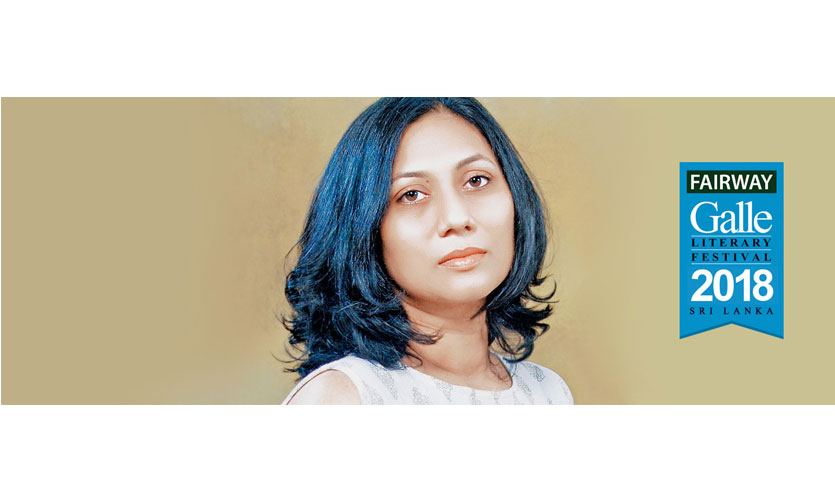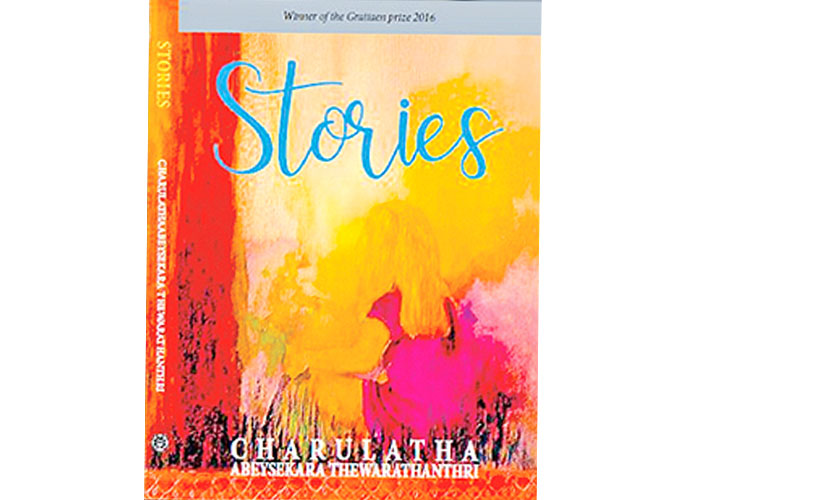Gratiaen Prize winner of 2016, Charulatha was educated at Visakha Vidyalaya and obtained a Civil Engineering degree from the University of Moratuwa in Sri Lanka, but opted to be a teacher. Today she is a happy home-maker and mother of four, engaging in her favourite pastime – writing.
Her award-winning novel, 'Stories' followed Cheran, a young Tamil student at University in the UK.
1. What got you into writing?
At first, I guess I was doing what any child does. I was imitating my parents. They saw the world differently, they saw stories everywhere, and they told them with their writing. I did the same, without thinking, sort of instinctively. I cannot remember a time I wasn't writing poems and stories.
But what got me started on novel writing was loss. When my father died, I coped by writing. I started writing our memories, and it developed into a story somewhere along the way, became ‘Autumn Leaves', my first novel. The second novel ‘Stories' was born out of longing for motherland, while living elsewhere. Again, I began writing the memories of my own childhood but ended up making a story out of them.
2. You won the much coveted Gratiaen Prize in 2016 for your book ‘Stories’. How did it feel?
I had a feeling the manuscript would get shortlisted, but when it did, and the shortlist was read out, I gave up all hope of winning. Because I was up there with veterans, absolute giants, in the literary field. But ‘Stories' won. It was totally unexpected, it was surreal like a dream. And it felt wonderful. Finally, I felt I was truly worthy of being my parents' child.
3. In an interview, you mentioned that your novel ‘Stories' took over three years to write. What prompted you to start writing the book?
When our family moved to Mauritius, I began to miss Sri Lanka very much. The memories of my childhood, especially of the times I spent in my aunt’s estate in Ruwanwella, began to surface frequently, with amazing clarity like never before. I began to write them down, mostly just wanting to preserve them, to read later when the memories fade. And then I guess the storyteller in me took over and weaved a story out of them.
4. With four children to look after, you must have had your hands full! What was the writing process like?
Yes, my days were full with being a wife and mother. But writing is my drug. It's how I relax, it's what I do when everything else gets me down, and when I'm on cloud nine. I didn't have to make an effort to write, I just wrote every day, because I needed to write. Although I wrote every day, I didn't write the book every day. Stories have a way of acquiring a personality of their own, and will flow and unfold the way they want. I wrote what came easily and naturally, whatever that insisted on being written at the time, be it the novel, or another story or a poem.
5. Tell us a little bit about the novel ‘Stories' and what inspired it? Since it's based on tidbits of your childhood; how much of it is fiction and how much of it is fact?
I've always been fascinated by the way life unfolds, how everyone's lives overlap with everyone else's, how coincidences steer us in different directions, and in retrospect, how it all seemed quite magical. Time and again, I've been reminded by events in my own life that all I need to do is let the ‘universe unfold as it should.' It's this quality that drove me to write ‘Stories', and what holds the story together. Almost all incidents are based on fact, but have been heavily fictionalised and exaggerated.
6. Writing a novel based on bits of your own life makes it pretty personal. How did you draw a line in your writing to make it not too personal?
I don't think I did. I took my own experiences and other people's accounts of their experiences and wove them into one story. I don't think I ever consciously tried to distance it from my life. I just did whatever worked for the story.
7. You wrote your book to also appeal to the international reader. How do you write a story based in Sri Lanka in such a way to help foreign readers, who have never been exposed to Sri Lanka and its culture, understand and imagine what is going on?
At first, I had no intention of even publishing this book, so I did not write it for anyone except myself. Then when I shared it with family and friends, I realised that some bits needed a bit more explaining, a bit more background for a reader to grasp the story. So the second stage was writing for ‘someone else.' The third stage was writing for the ‘international reader' when it was pointed out by my editors that some instances/sections of the story were at risk of losing the reader because what I had written about was just too foreign to them. So I had to sit down and facilitate better understanding of the reader. This happens with places, people, incidents, how people react in certain situations, etc. For example, I mention places in Sri Lanka like Jaffna, Wellawatta, Ratnapura, Nugegoda. Now we in Sri Lanka carry a mental image with us about these places, we have sights, sounds, smells and feels associated with that place, and hence have a base for the incidents to unfold upon. But for a foreign reader, these are just names of some places in a distant land. So I had to provide certain information about these places, relevant information, and just enough of it so as not to bore the reader, so that the reader could paint a realistic picture for himself.
It was the same with people. We know and understand certain actions of, say, a mother, a lover or an estate worker, in the Sri Lankan context, within our culture. There is a certain way we behave, which a Sri Lankan reader will understand and agree with, whether he condones it or not. But these actions might be so unrealistic to a foreign reader that it strikes raw like a jarring, out of place note. And you are in danger of losing your reader. Then the writer has to bridge the gap by providing enough information to the reader to help him understand the relevant mindset, the upbringing and cultural roots which the behaviour springs from.
Then there are the phrases and idioms inherent to a language, which work to convey an idea effectively and powerfully. But when you write in English to an international reader, who isn’t familiar with Sinhala or Sri Lankan English, I believe we need to write in the language that best fits the reader. Since we can’t write in everyone’s dialect, it would be best to write in standard British English.(This is up for debate of course). So when you have a character in your story speaking in their native language - Sinhala or Tamil - and you're writing that dialogue in English, it might be a good idea to write as if a native English speaker is speaking those words, instead of a local Sinhalese/Tamil speaking in English. But when your character speaks in English, let him/her speak colloquial English, because that's how we speak English. Unless you deliberately decide that the voice of the author or first-person narrator is going to be colloquial or a particular dialect.
8. Since winning the Gratiaen Award, how has it helped you in your pursuance as a writer?
It's made me a more confident writer. Actually, I never thought of my writing process or techniques. I write like a bird builds a nest – instinctively. But with everyone asking me to describe and explain what I do, I've come to understand my own writing process better.
9. Any plans for another book?
No plans. I write always. Writing is what I do when I’m happy, it’s what I do when I’m sad, I do it for every reason and no reason. Another book? Maybe. If one decides to come along.
10. In your opinion, what is the one thing any aspiring Sri Lankan writer should know in order to write a successful book?
He should know why some books grip him, thrill him and move him to tears, while others bore him, and fail to hold him for long, if at all. Then he should go and write the book he loves to read.
The Fairway Galle Literary Festival (FGLF) returns for its ninth year at the Galle Fort from 24 –28 January 2018. For more information about the 2018 Festival visit galleliteraryfestival.com/
Read our interview with the other authors here


1 Comments
Valarie Weerakoon says:
Dec 06, 2017 at 02:09 amI was very happy in reading about the Author Charulatha and why she wrote the book 'Stories' Is the book available in Australia? Where I live, if so give me the name of the Book store. Valerie